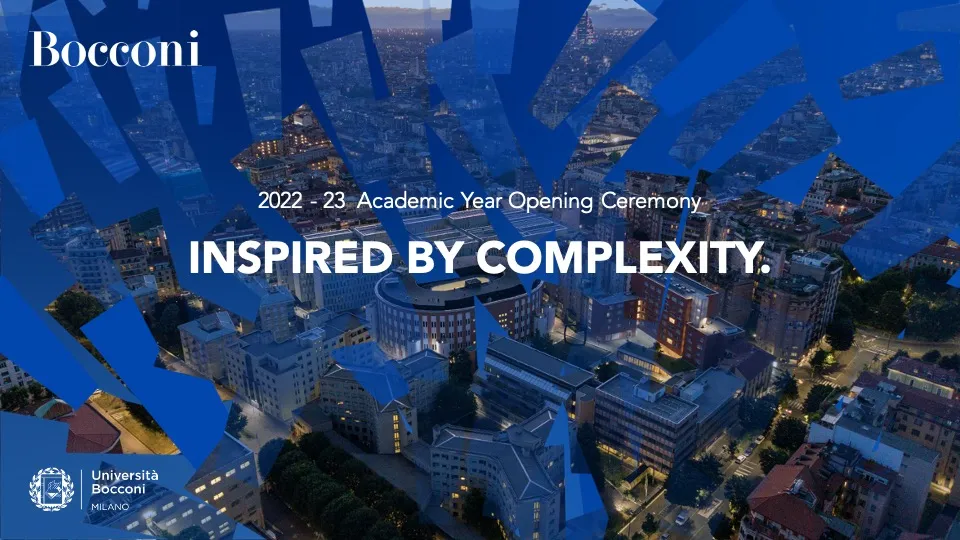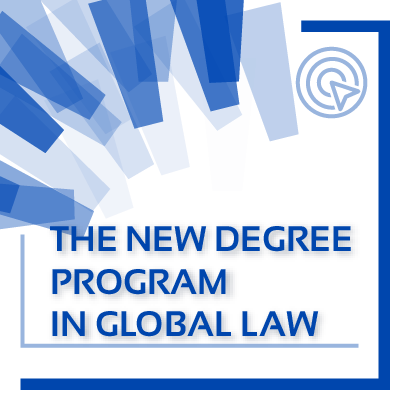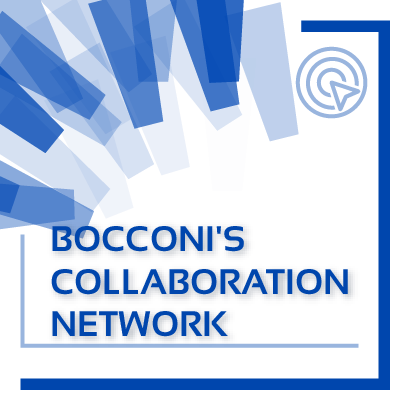
Bocconi, a University of Social Sciences inspired by complexity
Study, analyze, and understand complexity. In a world dominated by economic and geopolitical shocks that make it more and more difficult to make predictions, we must be able to do problem framing, even before problem solving. We need to adopt a broad vision and a diversified approach to problems to be able to 'connect the dots'. Precisely the theme of complexity was today at the center of the inauguration ceremony of the 2022/23 academic year, the 121st of the University. Bocconi's commitment to consolidating its role as a research University in the social sciences was also stressed as a key to providing its community with the tools to approach complexity. The ceremony, which saw speeches by President Mario Monti, Rector Gianmario Verona, and Denis Mukwege, Congolese gynecologist and Nobel Peace Prize Laureate. Dr. Mukwege founded the Panzi Hospital in DRC, a leader in the care of women victims of wartime rape, was held in the presence of Vice President Andrea Sironi, and Managing Director Riccardo Taranto.
"The war in Europe with the consequent energy and food crises, together with the geopolitical tensions between the different blocs, are putting European and democratic values to the test," declared President Monti. "The search for an open society, more supportive, attentive to mitigating inequalities must be a commitment for everyone, leaders and citizens. In this context, the role of an institution like Bocconi must be that of analyzing the context and stimulating sustainable responses. This was one of the strong lines that characterized the long and fruitful rectorate of Gianmario Verona, to whom the Board of Directors and my staff extend their warm thanks. The path of recent years towards a university increasingly attentive to diversity and inclusion will be further accelerated in the near future, as indicated in our strategic plan."
"We live in a world that is more complex every day, where it is increasingly complicated to predict future economic and geopolitical scenarios," underlined Gianmario Verona in what is his last inaugural speech as Rector: his third term will end on October 31. "In this context, the role of a university is to set up a journey into the problem to be faced and immerse itself in studying it, to connect the dots by analyzing the problems from multiple angles. That is, problem framing comes before problem solving. Accept and study complexity, do not trivialize it through simplification. Dealing with complexity means changing the simplistic perspective of 'finding a single optimal solution'. And to do this, Bocconi has opened up to new skills and collaborations that will complement its ability to analyze complexity."



Hence the strategy of expanding to the whole of the social sciences, in particular strengthening the faculty in the directions of political science and computer science. The educational offer is supported by constant innovation in teaching and methodologies and is opening up more and more to collaborations with networks and university partners of excellence in Italy and around the world.
Looking at teaching, after the launch this year of the Master of Science in Transformative Sustainability in collaboration with the Politecnico di Milano, today was announced the launch of the new program in Global Law, the first Bachelor in English in the field of law (which will be active from the academic year 2023/24) and which brings the Bocconi offer to 26 programs (there were 20 at the beginning of the Verona rectorate, in the academic year 2016/17).
The complexity of Bocconi's offer is the result of the ever-increasing attention to human capital and research. During the last academic year, Bocconi scholars won 5 new ERC (European Research Council) Grants, thus bringing to 25 those currently active in the University (17 in 2016) and to 47 the total of projects hosted since launch in 2007. Bocconi today has become competitive not only in its traditional fields but also in the new areas to which it has opened: overall, in fact, Bocconi has won ERC grants in 8 different sectors from economics to mathematics, economic history and computer science.
Still on the research front, this year, after the recent launch of the Algorand Fintench lab, the ION Management Science Lab will be presented, dedicated to the analysis of business strategies and organization in the light of the digital transformation of companies, bringing to 10 the number of laboratories activated in the last six years.
The innovation introduced in recent years has proceeded in parallel with the continuous international drive that has always characterized Bocconi. Today, 25% of professors are international and come from 32 countries, up from 15% in 2016, a result made possible by the 167 hires of the last six years and 25 in this academic year alone. The growth of the teaching staff has also focused with determination also on a greater gender balance: today there are 131 women professors (+22.4% compared to 2016) and full professors have tripled, going from 8 to 24.
22.4% of the 15 thousand students are also international (+46.7% compared to 2016, from 124 countries of the world), a percentage that rises to 42% if we consider only the classes taught in English. Bocconi is increasingly international, but also selective University, in search of the best talents: the growth of applications to enter Bocconi reached 22,081 this year (54% more than 6 years ago) corresponding to an increase in selectivity that today sees 17.6% of candidates admitted to undergraduate program, compared to 29.2% in 2016.
Complexity must be studied and understood, thanks to wide-ranging research and training that is as multidisciplinary as possible, but it must also be addressed with economic support where it becomes an obstacle to the right to study. In the 2021-22 academic year, Bocconi allocated 37million euros to support its students, so much so that, today, 1 in 4 students benefits from one of the forms of aid. In this path towards ever greater inclusion, the role of donors (individuals, companies and foundations) who supported the University was also fundamental: in 2021, 5.7 million were raised for social mobility projects, compared to 2.6 million in 2016. Today there are 14 named funds to support students, six of which are dedicated exclusively to female students.
But Bocconi's inclusive and supportive role goes beyond actions aimed at its own community. Two activities were promoted in particular in the aftermath of the outbreak of the Russian invasion in Ukraine: the Ukrainian Community Empowering Program, aimed in particular at the Ukrainian community gathered in Milan, and the Uasi, the legal support unit created within the Bocconi Lab in European Studies (BLEST).
Finally, there is the promotion and support of entrepreneurship, to help build an ecosystem of startups able to grow and compete in Italy and abroad. B4i – Bocconi for Innovation, the University's accelerator, has just welcomed 6 new startups, thus bringing to 130 the startups hosted in three years (it was born in 2019), of which 93 entered in the pre-acceleration programs and 38 in acceleration. In this way, B4i supports an ecosystem made up of 427 entrepreneurs, of which a quarter are women. An ecosystem that to date has been able to raise 10 million euros and create 60 new jobs.
Teaching, research, development and inclusion of human capital and a multidisciplinary vision that challenges complexity by diving into it. Bocconi's results are well summarized by two sets of numbers: fourth place in Europe and the tenth in the world in Social sciences and management in the QS ranking and the fourth place in Europe and 17th worldwide according to US News.
Address for the Academic Year Opening Ceremony 2022-2023 by Rector Gianmario Verona